Reddit User Refuses To Give Back The Ferrets He Was Fostering Because Of Abusive Owner
Most people love animals, and many either want to have pets or already do, because who wouldn't want an adorable, loving creature running around their home, providing comfort when needed?
Unfortunately, not everyone is in a position to dedicate the time and money required to care for a pet properly, especially if it's a more demanding pet like a dog.
It's important to remember that you shouldn't adopt a pet if you're unsure you'll have enough time to care for your furry friend properly. These animals rely on you in many aspects of their lives once you decide to adopt them, so it wouldn't be fair to provide a home while disregarding their numerous needs.
It seems that this is what happened to OP's friend after they asked him to take care of their ferrets while they resolved a relationship issue. OP was unaware of what awaited him when he agreed, as the owner assured him that the ferrets were being cared for properly and that he wouldn't have any issues with the ferrets and his child.
The ferrets were in terrible shape when he received them, and he did everything he could for the poor animals who had been mistreated throughout their time with their previous owners. Things were going well until OP learned from a friend that it was illegal to own ferrets in their state and that he could face a year in jail if found with them in his home.
After everything he had seen and heard, OP decided to find a new home for the ferrets because the previous owners didn't want to take them back, and he was uncomfortable with the fact that ferrets were illegal in his state. He felt guilty about rehoming them, even though their new home is wonderful and they are now in a state where it is legal to own them.
This is why he turned to Reddit to seek more opinions on his decision, so make sure you scroll down to see what people had to say.
The ferrets were in terrible condition when OP took them in, and it later became clear that they were, in fact, not good with kids.
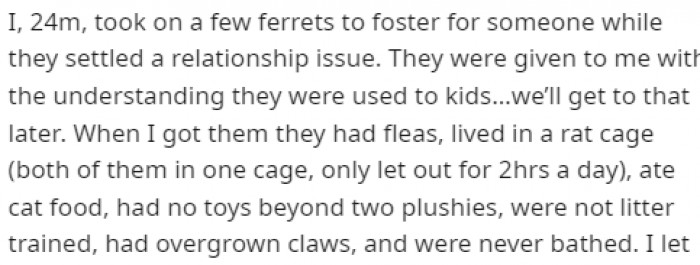
After seeing the condition the ferrets were in, he did everything he could and bought everything they might ever need.
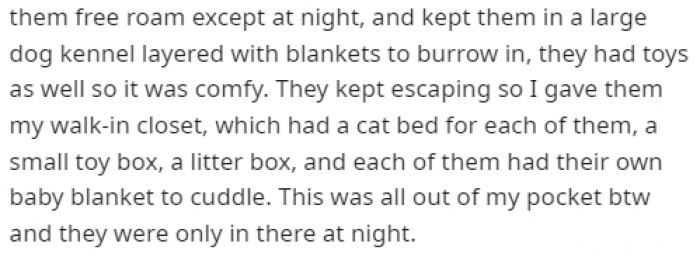
After discovering it was illegal to own ferrets where he lived, OP decided to rehome them.
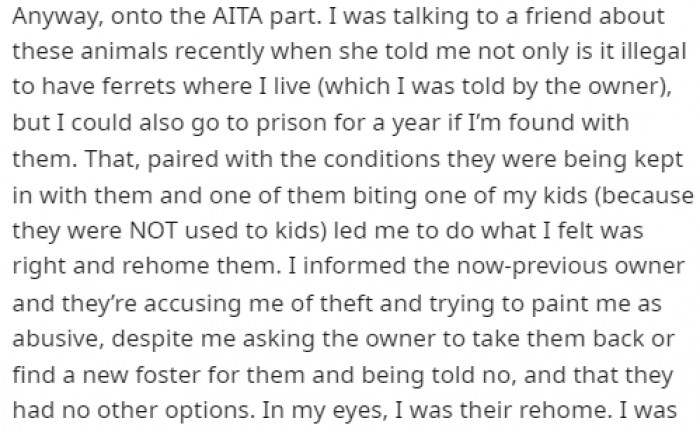
The Psychology of Fostering Animals
Fostering animals often triggers complex emotional responses, especially when the fostered animals come from abusive backgrounds. According to Dr. Samantha Ellis, a clinical psychologist specializing in animal-assisted therapy, the act of rescuing animals can serve as a therapeutic outlet for many individuals. This behavior may stem from a desire to nurture or heal, mirroring their own unresolved emotional wounds.
Research from the American Psychological Association shows that engaging in nurturing behaviors can enhance emotional well-being and foster a sense of purpose. The psychological benefits of fostering can include improved mood, reduced anxiety, and increased social connections, which are essential for mental health.
He found a wonderful new home for the ferrets, but he still felt guilty for what he did, so he turned to Reddit.
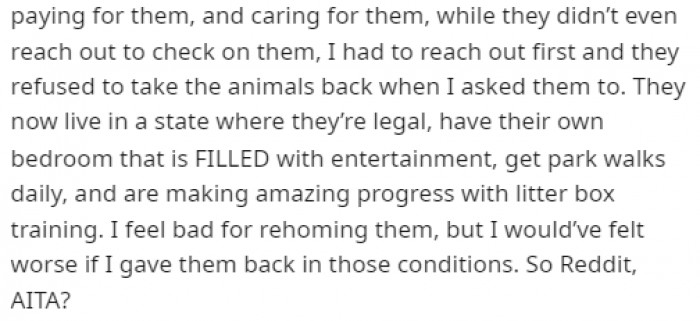
As always, the people of Reddit showed up when needed.

No love for the ferrets.

Moreover, the conflict between the foster caregiver and the original owner highlights the psychological concept of attachment. Attachment theory, developed by John Bowlby, posits that early relationships shape how individuals relate to others throughout their lives. When a painful history is involved, such as with the abusive owner, it can trigger a defensive response from the foster caregiver, leading to a refusal to relinquish the animals.
This protective instinct often arises from a mix of empathy for the animals and a personal need to assert control in a situation where they feel powerless. Understanding this dynamic can help address the underlying emotional struggles faced by the foster caregiver.
Best decision.

Asking the right questions.

Fair enough.
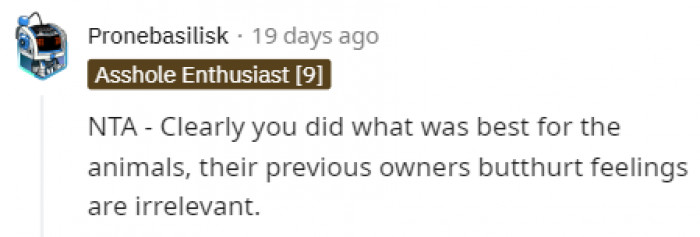
Practical Solutions for Conflict Resolution
To navigate these emotionally charged situations, it's essential to employ conflict resolution strategies that prioritize empathy and understanding. A clinical psychologist suggests that both parties engage in open dialogue, focusing on the needs of the animals while acknowledging each other's feelings. Utilizing active listening techniques can foster a sense of validation, allowing each party to express their concerns without becoming defensive.
Additionally, involving a neutral third party, such as a mediator or animal welfare organization, can help facilitate a resolution that respects the best interests of the animals. This approach aligns with research indicating that collaborative problem-solving can lead to more satisfactory outcomes in emotionally charged disputes.
I'd say that we all are.
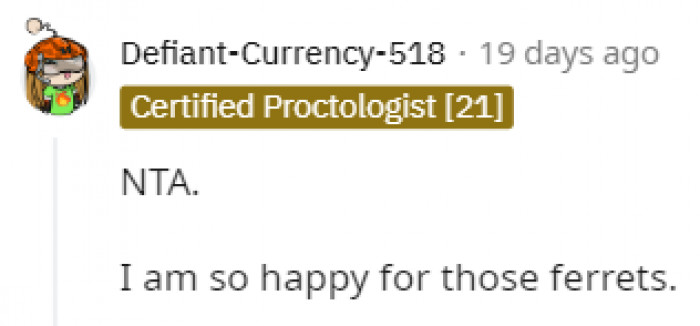
Such a sad story. It's heartbreaking to see that those ferrets were mistreated for so long, but at least they found a new forever home where they'll hopefully be taken care of properly.
The people of Reddit told OP that he did a good job, but do you agree with them?
Psychological Analysis
This situation illustrates the complexities of attachment and protective instincts in human-animal relationships. When an individual fosters an animal, they may unconsciously project their own emotional needs onto the animal, creating a bond that feels deeply personal. It's important to recognize that the refusal to return the ferrets may stem from a fear of repeating past traumas associated with abandonment or loss.
Analysis generated by AI
Analysis & Alternative Approaches
In summary, the dynamics of fostering and the associated emotional conflicts reflect intricate psychological patterns. According to Dr. Ramani Durvasula, clinical psychologist, "Understanding the emotional complexities involved in fostering can lead to better outcomes for both the caregiver and the animals." The interplay of attachment, empathy, and conflict resolution serves as a reminder of our shared responsibility in caring for vulnerable beings. As Dr. Kelly McGonigal, health psychologist, states, "Empathy is a crucial component in fostering healthy relationships, whether with people or pets."



